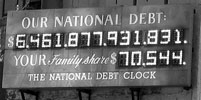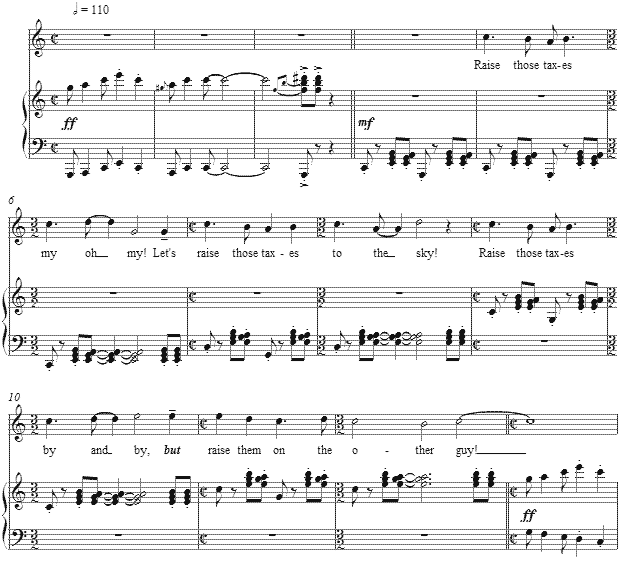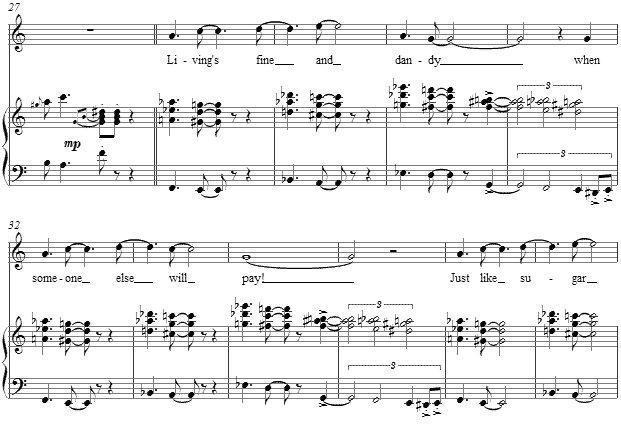Music and Texts of GARY BACHLUND
Vocal Music | Piano | Organ | Chamber Music | Orchestral | Articles and Commentary | Poems and Stories | Miscellany | FAQs
Raise those taxes! - (2009)
Gary Bachlund
for medium or high voice and piano
Raise those taxes! My, o my!
Let's raise those taxes mountain high!
Raise those taxes by and by,
But raise them on the other guy!
Crazy taxes slip on by!
Make crazy taxes! Who'll ask why?
Crazy? Yes, vote with "aye!"
'Cause lazy me's my alibi!
Living's fine and dandy
When someone else will pay!
Just like sugar candy
Without the tooth decay!
Praise folks' taxes feeding me!
Oh, praise those taxes, yes sirree!
Praise those taxes' spending spree!
Who pays those taxes! It ain't me![ 3 pages, circa 1' 10" ]
The National Debt Clock
One subject dominates much of the news, and that is taxes. From the United States to nations in Europe to the so-called third world, public spending is being funded by a combination of precipitously increasing debt and the calls for new taxes. "Raise those taxes," various politicians and pundits urge. The streams of this one theme are several, from the cap-and-trade urgings of environmentalists who see taxes as a way to essentially punish polluters from the national and corporate to the individual, to those politicians whose various projects "for the common good" require greater funding than a particular government at present is able to generate from their tax paying public. Many more arguments come to the same urging eventually, "Raise those taxes!"
What I found amusing in reading of the various arguments was the notion that people, from voters to politicians, all somehow think that raising -- this is crucial to the argument -- someone else's taxes can be done without impacting their own tax liabilities. The poor want the upper financial classes to pay more with their "tax the rich" mantra; the well-to-do want the lower financial class to bear a "fairer" portion of the burden. Some advocate flat taxes, and others advocate national sales taxes. The aim seems to be -- get someone else to pay. This is not always the case, of course, as many tax schemes come back to haunt their advocates who thought themselves exempt. As to the public sector which is already funded from tax revenues, the notion that the public sector pays "new" taxes is disingenuous for they pay from other taxes another portion "back" into the system, but this is not in any way new revenue, but old. Recycled, if you will. Only private productivity creates new wealth, and on this the public sector lives and many times enriches itself. So the argument for new taxation usually means "someone else," just as is the all-too-human human penchant which has come to be known as NIMBY -- "not in my backyard." Given the humor which I find in the utter panic generated to somehow justify new taxes, I thought to add to the humor with this text, which immediately suggested a musical setting.
The opening "look at me" gesture gives way to a two measure oompah-pah accompaniment of usually five beats duration (in cut time). This gesture, as with the cry to raise taxes, merely is repeated in successively higher octaves until the verse is complete. Over this simple repetition of a musical "argument," the vocal line offers a syncopated plea. "Raise those taxes!" Note that it is not -- and can rarely if ever be -- "raise my taxes." [ 1 ]
The second verse is a musical repetition of the first, excepting the accompaniment beginning an octave higher and finishing an octave higher, to mimic the ever rising chorus of alarm from politicians of all stripes and brands for their version of "gimme." The third stanza of this rhyme breaks from the repetitive A section as a set of slumping half steps rising higher only to slump again in the half note triplets accompany the vocal syncopation.
The score for Raise those taxes! is available as a free PDF download, though any major commercial performance or recording of the work is prohibited without prior arrangement with the composer. Click on the graphic below for this piano-vocal score.
NOTES
[ 1 ] The spark for this rhyme came from the very silly remark carried on the news, in which former Chief of Staff and Secretary of State Colin Powell opined, "Americans do want to pay taxes for services," and "Americans are looking for more government in their lives, not less." (source, ABC) One notes that the statement is not presented in the first person singular -- "I" -- but in the collective -- "Americans." In this as with all categorical statements about any group of people as diverse as a national population, there is a lie. Some Americans feel this way, as apparently does Mr. Powell. Others obviously do not, as rebuttals to his statement were swift and noisy. The philosopher Gilbert Ryle would remind us that this is an "error of category" at the minimum. Powell, a private citizen, does not and cannot speak for "Americans" any more than can I. I refrain, but know that others leap to speak for me -- even when they are incorrect or lying outright.
I add to my remarks only this. One is watching the same dialogue in other nations, as I write this in Germany, or correspond with my friends in Great Britain. What seems assured is that taxes -- and public debt, which is horribly and sadly taxation of the future marketed and spent today -- will not always and ever raise. But when they do, those proposing them will likely believe they will be exempt, while "others" will pay. For this the very wise Frenchman, Frédéric Bastiat (1801-1850) who was a classical liberal theorist and political economist, observed, "Government is the great fiction, through which everybody endeavors to live at the expense of everybody else." From his perspective, the out-spoken Mr. Powell seems remarkably like a man retired from decades of "public" service and receiving "public monies" far greater than the average American. From that financial advantage and social vantage, it seems he does not speak for, as he put it in his very silly assertion, "Americans." Some, but not many, I reckon.
Addendum (2011)
The sheer stupidity of this funding of government by borrowing from next generations and then assigning them to pay off the debt is horrible. But how horrible is it? I set this rhyme in 2009. At the end of 2011 -- mere years later -- the debt clock has changed from over $6.46 trillion to $14 trillion -- more than double that amount. There is no rational or even sane explanation for this. excepting that government has become irresponsible in the extreme, all the while its politicians are campaigning for elections as being intelligent, reasonable and responsible adults. Irrespective of political party or ideology, there is no explanation or excuse. Fools is the best description I can manage for all the parties and the Federal Reserve.
Lest this seem a diatribe aimed squarely at the United States government alone, it is an accusation laid to all the governments, for the current "crisis" is not ultimately about banks and solvency in the private sector, but about government debt which will not be repaid to the private sector which has made loans to government, but rather abrogated in the future.
Addendum (2013)
Over 17 trillion and growing. Were this being done by a private sector entity, it would be called far more than irresponsible, likely a Ponzi scheme of enormous proportion, and -- well -- illegal. but governments define the word, "legal" and they are letting themselves off the hook. Simple mathematics will not be so forgiving.



